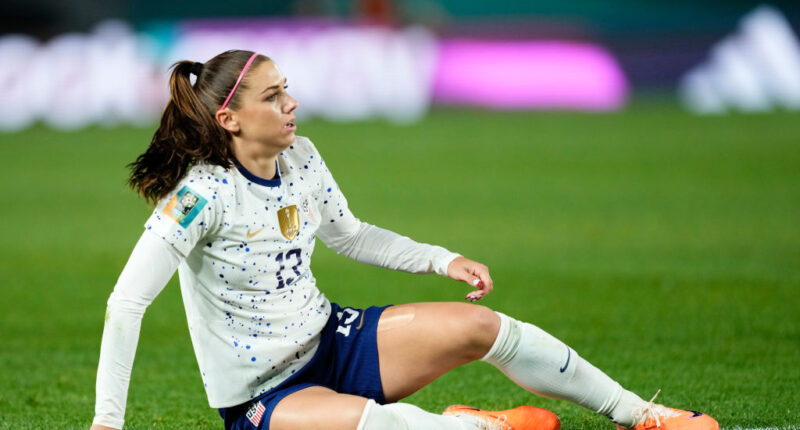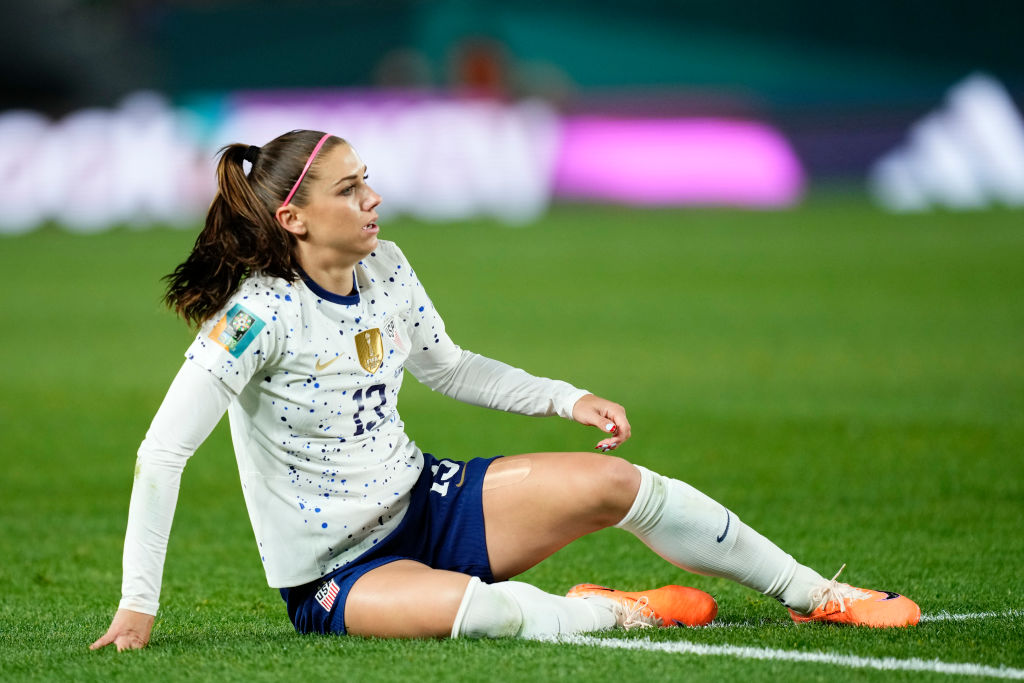USWNT: This story first appeared in Extra Time, our pop-up newsletter about the 2023 Women’s World Cup.
Wither America?
I’m writing Extra Time early this afternoon, on like a sixth cup of black coffee after rising out of bed in the middle of the night here in the U.S. to watch a very puzzling, if not downright disheartening, U.S. Women’s National Team (USWNT) performance against Portugal, still wrestling a bit with the whole affair. Perhaps you are too, if you watched. If you chose sleep—not a bad call, frankly—the Americans were so, so, so very lucky to escape with a 0-0 draw and sneak into the knockout stage, the portion of the World Cup toward which the team is usually strutting. If it weren’t for a goal post that stopped a late-game shot from Portugal’s Ana Capeta, USWNT would be boarding a flight from Auckland to some disappointed airport in America.
(One reporter joked that a bored physicist should perhaps explain how close Capeta came to scoring the goal. A matter of inches or centimeters? Not a terrible idea.)
I’m trying to avoid ornery overreactions based on bleary eyes. Hopefully, caffeine and a reasonable brain are helping fight that instinct.
So here goes…
First, a few thoughts on what I have a hunch will become a talking point in the days leading up to the USWNT’s round of 16 matchup, almost certainly against a formidable Swedish side, in Melbourne at 5 a.m. E.T. on August 6. I mean, of course, about the dancing.
In the moments after the listless U.S.-Portugal draw, Fox Sports’ camera caught Megan Rapinoe and Alex Morgan—the two veteran faces of the program, the legends, who have zero goals in this World Cup so far between them—dancing and smiling on the field, celebrating something that is, by any measure, a laudable achievement: reaching the knockout stage of a World Cup.
Former U.S. star Carli Lloyd—who, if I can be slightly immodest for a second, I sort of predicted would throw some darts as a Fox Sports studio analyst—was not happy when she saw her former teammates having fun. She also didn’t love Trinity Rodman taking pictures with fans in Auckland.
“I have never witnessed something like that,” Lloyd said on TV from her desk in Sydney. “There’s a difference between being respectful of the fans and saying hello to your family. But to be dancing, to be smiling—I mean, the player of that match was that post. You’re lucky to not be going home right now.”
Give Lloyd credit. “The player of that match was that post” is a terrific line. Her agent should be asking for a raise.
But I’m not all that worried about the USWNT attitude. Rapinoe will tell you until she’s blue in the face: she plays with joy. She wants the team to relish joy. Morgan talks about it too. Joy. Joy. Joy. It starts with these veteran stars, whom many of the younger players have looked up to since they were kids, and trickles down to players like Rodman, whom they are mentoring.
It’s just the way the team is wired. That joyful m.o. has delivered two straight World Cup titles.
Lloyd is a more intense, inward player. That worked for her. But the success of this team won’t hinge on any dancing, or lack thereof.
U.S. coach Vlatko Andonovski called Lloyd’s words “insane.” He coached Lloyd at the 2021 Olympics. Their relationship clearly wasn’t warm and fuzzy.
“This team wanted to win this game more than anything,” Andonovski said after the game. “To question the mentality of this team, to question the willingness to win, to compete, I think is insane.
“It’s not like we played well, by any means. We owned it. We know it’s not good enough. We’re not happy with our performance. But we qualified for the next round. We’re moving on.”
Speaking of Vlatko: if you weren’t watching a post-game studio show around 5 a.m. E.T., hanging on every word, you may have missed some punditry criticizing him for ceding the on-field huddle after the game to Kelley O’Hara, a veteran playing in her fourth World Cup. As if O’Hara were filling some clear leadership void.
That seems like a stretch. Calling Andonovski on lack of halftime adjustments or his substitution patterns or predictable tactics is totally appropriate. But there’s some school of management theory out there insisting that a coach who allows an experienced player to have a first say is a practitioner of strong, secure leadership.
In the end, all that matters is how the U.S. fares on Sunday in the first knockout round. Some more substantive worries than huddle decorum and dancing include:
1) Alex Morgan. After the game, she seemed to chalk up her inability to convert to some bad luck. Hmm. It’s been three games at this point. She’s had so many chances. She’s Alex Morgan. But is she that Alex Morgan, the outstanding striker? It’s more than a fair question at this point.
2) Alyssa Naeher. That was a bit of a scary game for her. She let a soft shot out of her hands; if a player in red happened to be standing nearby, Portugal would have been playing in Melbourne. She also left her line at one point and didn’t come close to punching a ball out of the air. She was very lucky a Portugal player didn’t sneak behind her and end the game. Naeher didn’t have to make any stupendous saves in the group stage, perhaps a credit to the U.S. defense, which after all allowed only one goal in its first three games. She hasn’t really been tested.
Luckily, Naeher has experience succeeding in the most stressful event in soccer: shutting down penalty shots. In the knockout stage, if a game goes to kicks, Naeher could rise again.
3) More generally, who’s really connecting with each other on the field? Who are the two or three players who are totally in sync? When Rapinoe and Rose Lavelle came into the game against Vietnam, they instantly made things happen (though they didn’t score a goal). The forwards up front haven’t been in rhythm since Morgan flicked a neat ball to Sophia Smith, resulting in her first-ever World Cup goal. That happened in the 14th minute of the opener, nearly two weeks ago.
4) Watching big, strong, technical, creative players from around the world put on scoring displays—like England did against China (6-1) and the Netherlands did against Vietnam (7-1) on Tuesday—you can’t help but wonder, is the world just better than America right now? Another fair question. We’ll find out, for real, soon enough.
Colombia’s Story
If none of the young American talents that we’ve spotlighted in our coverage—like Rodman and Smith—are going to seize the role of breakout World Cup player, Linda Caicedo will gladly step up. Caicedo, 18, has scored the consensus goal of the tournament so far. Please enjoy it if you haven’t seen it. Off a blocked shot against Germany on July 30, Caicedo pitter-patters between a pair of defenders on the near-left side of the 18-yard box, before launching the ball at a diagonal dream angle. She placed it perfectly, in the top-right corner of the box, giving Colombia a 1-0 lead in the first-half stoppage time. It was her second goal of the tournament. Las Cafeteras—the Coffee Growers—went on to shock Germany 2-1. Colombia now sits atop Group H, ahead of its final group-stage match on August 3, against Morocco. With a draw, Colombia will advance to the round of 16 for the second time in its history. Colombia did not even qualify for the 2019 World Cup in France.
Caicedo has had quite an early run in life. In 2020, she felt pain in her abdomen. She was informed she had ovarian cancer at the age of 15. “At the time, I didn’t think I could play professionally again because of all the treatments and surgeries I had to go through,” Caicedo later told FIFA.com. That March, as the COVID-19 pandemic began to spread throughout the world, Caicedo had surgery. After six months of chemotherapy, she returned to the pitch. Real Madrid signed her earlier this year.
There are legitimate concerns, however, about Caicedo burning out too soon. She went down in a training session before the Germany game, clutching her chest. Medical staff, however, cleared her to play. Late in the game, she fell again, first to her knees then face down in the grass. She did get up, showed a thumbs-up, and finished off the game.
Let’s hope Caicedo rests up before Morocco. Who knows what we’ll see from her next.
Matilda Madness
Who needs a superstar?
Granted Australia, the co-host nation that has advanced to the round of 16—New Zealand didn’t qualify—would love Sam Kerr back. The international goal-scoring machine hasn’t played in her home World Cup since suffering a calf injury before the tournament. Her absence has been a major storyline so far. She was available to come in as a sub on Monday against Canada, in a must-win game for the Matildas.
She wasn’t needed.
Australia rose to the occasion, destroying Canada, the defending Olympic champs, 4-0 in their final group-stage game, and ensuring that at least one of the World Cup hosts would remain in the tournament.
And Hayley Raso is a name to remember. Raso, who also suits up for Real Madrid, is the first Australian player to sign with the legendary club. She recorded a “brace”—or scored two goals—in the win.
(Why is it called a brace? The explanations are a bit iffy, but the term seems to have some roots in hunting. “When hunting, if someone were to hunt a brace of birds it would mean they shot/killed two birds on their hunting trip,” says The18.com, a soccer website. According to Northwoodsbirddogs.com—your reliable source for soccer slang— “hunting two or more bird dogs together is a brace.”)
On the other side of this ledger, Canada’s World Cup ended in bitter disappointment. It’s been a tough year for a team that’s played some memorable matches against the USWNT on the international stage. The players have been mired in a pay fight with their federation all season.
Canada’s exit also likely marks the end of Christine Sinclair’s World Cup career. The 40-year-old forward is the leading international goal scorer in history, women’s or men’s. On the way out of her sixth World Cup, she called out her country’s lack of investment in women’s soccer.
“Things have to change,” Sinclair said. “We don’t have a professional league. We don’t have that pathway for players to make the national team. If this isn’t a wake-up call, I don’t know what is.”
Recommended Reading
What the U.S. women—and men—stand to make in FIFA prize money at this World Cup, thanks to an historic equal-pay agreement. (TIME)
More on Colombia, and the country’s passionate fans. “The most recent census showed there are only about 38,000 Colombian-born people living in Australia and it felt like every single one of them was in the Sydney Football Stadium for the match.” (Reuters)
Jamaica coach Lorne Donaldson praised the strong World Cup success of upstart women’s soccer countries like Nigeria, which is through to the next round; Colombia, which leads its group; Morocco, which is still in the mix; and Jamaica itself, which is tied with France atop Group F after two games. The Reggae Girlz face Brazil on Wednesday morning, at 6 a.m. E.T. in a huge final group game: Brazil is only one point behind the co-leaders.
Remember, only two teams from each group make it to the knockout round.
Donaldson’s not pulling any punches. “You talk about smaller women’s football countries, and the growth has been tremendous,” he said at a pre-match press conference. “The smaller countries now will realize there’s a platform out there [as will] young women and girls all over the world. All these governments and everybody, it’s time to step up. Cut the bullcrap. Step up and support women’s football. And let’s move along.” (ESPN)
A handy bookmark: the race for the Golden Boot, given to the tournament’s top goal scorers. Megan Rapinoe won it last time, with six goals, with Alex Morgan matching her total (Rapinoe broke the tie since she tallied her haul in fewer minutes on the field). Notice no U.S. players are near the top of the standings.
But there’s still time for that to change. (Fox Sports)
Parting thought
Returning quickly to Lloyd. While her criticism of the dancing attracted considerable attention, I was more intrigued by something else she seemed to be hinting at in the postgame: that notion that this USWNT values money and fame above winning.
“Within this team, within the federation, within the culture, the mentality, the importance and meaning of winning has changed,” she said after U.S.-Portugal. “What has come from winning has become more important.” To his credit, fellow Fox studio hand Alexi Lalas attempted to drill down Lloyd’s message. “I want to understand what you were saying,” he said. But Lalas even danced around the issue a bit, failing to ask Lloyd the direct questions that her words seemed to suggest, to this observer at least.
I wish Lalas would have asked: Are you saying that these players are too distracted by endorsements and riches and outside interests to win like they used to? Is it possible, in your mind, that endeavors like the fight for equal pay, and the spoils that come from that victory, have taken attention away from on-field performance?
If so, what players in particular do you suspect are less dedicated to winning?
Every player on the team seems to star in some commercial. Rapinoe’s in the Google and Nike ads. Smith has Wells Fargo and Chipotle and Nike; Morgan, Rodman, and Alyssa Thompson are all in spots.
Are those ads—which, by the way, help pay Lloyd’s Fox Sports salary—connected to the poor team performance?
Lalas kinda-sorta got at some of this.
But Lloyd then brought up the arrogant messaging of dancing.
I asked a Fox rep on Tuesday morning on the U.S. East Coast for a quick interview with Lloyd to ask those questions. The spokesperson said Lloyd is not doing interviews. And to be fair, it was pretty late Tuesday night in Sydney.
I’ll report back later in the week if Lloyd checks in. We’ll review the round of 16.
Somehow, the Americans are still around to see it.










